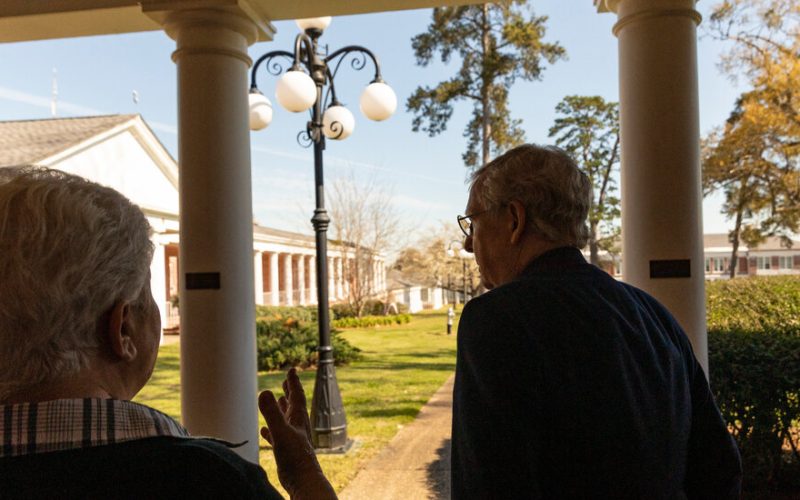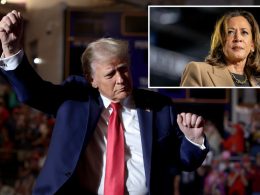Their numbers are dwindling now, the faded yellow newspaper clippings reporting their childhood trips to the hospital tucked away in family scrapbooks. Iron lungs, the coffin-like cabinet respirators that kept many of them alive, are a thing of the past, relegated to history books and museums. Some feel the world has forgotten them.
Now the nation’s polio survivors are reliving their painful memories as they watch events in Washington, where the Senate will soon consider the nomination of Robert F. Kennedy Jr., a fierce critic of vaccines, to be the nation’s next health secretary. And they are keeping a close eye on one of their own: Senator Mitch McConnell, the former Republican leader.
It has been nearly 70 years since Dr. Jonas Salk’s polio vaccine was pronounced “80 to 90 percent effective” against the paralytic form of the disease. Although the government does not keep official numbers, advocacy groups say there are an estimated 300,000 survivors in the United States. Mr. Kennedy’s nomination has prompted some to speak out.
The movie director Francis Ford Coppola recently recalled being in a hospital ward “so crammed with kids that there were gurneys piled up three and four high in the hallways.” The actress Mia Farrow, infected when she was 9, posted a picture of a room filled with iron lungs on Instagram with the caption: “No RFK Jr. we cannot go back to this. # polio.”
Representative Steve Cohen, Democrat of Tennessee, the only other polio survivor in Congress, called pointedly for the Senate to reject the nomination. “I believe I have a duty to speak out for all who have had polio — from those lightly affected to those who lived in iron lungs and died,” Mr. Cohen said in a recent statement.
Mr. Trump has also weighed in, telling reporters last month that he has friends who are “still in not such good shape” as a result of their polio infections. “Many people died, and the moment they took that vaccine, it ended,” he said. “Dr. Jonas Salk did a great job.”
Mr. Kennedy insisted he was “all for the polio vaccine” while touring Capitol Hill last month for the customary courtesy meetings with senators. But some of his recent statements suggest otherwise. He has said, for example, that the idea that the vaccine resulted in a drastic decline in polio cases is “a mythology” that is “just not true.” He has also asserted that the polio vaccine caused an explosion in soft-tissue cancers that killed more people than polio.
One of Mr. Kennedy’s closest advisers, the lawyer Aaron Siri, has petitioned the government on behalf of another client to revoke its approval of the stand-alone polio vaccine, and to “pause distribution” of 13 other vaccines, including some combination products that include the polio vaccine. A spokeswoman for Mr. Kennedy, Katie Miller, has said that “Mr. Kennedy believes the polio vaccine should be available to the public and thoroughly and properly studied.”
When asked about the concerns of polio survivors, Ms. Miller said: “My grandfather had severe polio and half his face was paralyzed. I still support Mr. Kennedy. These two things are unrelated.”
On Friday, The New York Times reported that Mr. Kennedy had opposed another critical vaccine. In 2021, when thousands of Americans were still dying of the coronavirus every week, he asked the Food and Drug Administration to revoke the use of all Covid vaccines.
In interviews, nearly a dozen polio survivors uniformly opposed Mr. Kennedy. Some said they are looking for Mr. McConnell to lead the charge against his confirmation.
“If McConnell fails to speak out on this issue it will undoubtedly stain his legacy,” said Susan L. Schoenbeck, a polio survivor and nurse educator whose book, “Polio Girl,” explores the stigma of polio and contains advice for medical professionals treating survivors. “I’m not sure the polio survivor community could ever forgive him.”
Mr. McConnell has spoken out, though only obliquely and without stating how he will vote. Without mentioning Mr. Kennedy’s name, he warned that “anyone seeking the Senate’s consent to serve in the incoming administration would do well to steer clear” of “efforts to undermine public confidence in proven cures.” The senator declined an interview request.
Post Polio Health International, a St. Louis-based nonprofit that promotes the “well-being and independence of polio survivors,” has sent a letter opposing Mr. Kennedy to all 100 senators.
Brian M. Tiburzi, the group’s executive director, said its members were looking for Mr. McConnell to speak out more forcefully. “I think people were left a little wanting by his original statement,” he said. “I think they would have liked him to take a more explicit stand against R.F.K.’s nomination.”
At the peak of the polio wave in the United States, in 1952, the disease sickened nearly 60,000 people, leaving more than 21,000 paralyzed and killing more than 3,000. Many children recovered and lived for decades without symptoms.
But as they have aged, many are now confronting “post-polio syndrome,” a constellation of symptoms including muscle weakness, fatigue and difficulty swallowing, which typically emerges 35 to 40 years after the original infection. Some who walked for decades are back in leg braces or wheelchairs. Some are unable to live independently.
Arthur L. Caplan, a bioethicist at New York University’s Grossman School of Medicine, who was infected when he was 5, recalls the children he befriended on the polio ward, some of whom went “down to the iron lung area, which was separate, and I never saw them again.” It is one reason he went into bioethics. He recovered, but the weakness in his legs returned about seven years ago, he said. His doctor told him the polio virus was “reawakening.” At 74, he now uses a walker for balance.
“I always felt like the voices that need to be heard are the kids who died, the kids who didn’t make it,” he said. “That’s the warning to Mitch McConnell about vaccines. It’s the message I think they would want to send.”
Polio survivors spoke of their fierce support for vaccinations — not only against polio, but for all vaccine-preventable diseases. They shared painful recollections, and stories of personal triumph.
Gary Ervin, now 87, said he “contracted spinal bulbar polio” — a severe form of paralytic polio — “in 1952 at age 14 and have not walked a step since.” He spent 12 days in an iron lung and was then transferred to a “rocking bed” that tilted from head to toe to help him breathe. He grew up to become an accountant, and later fulfilled his dream of learning to fly a plane.
Evan Davis, who has spent his life in a wheelchair, became a lawyer and served as general counsel to Gov. Mario Cuomo of New York. He said that Mr. McConnell “certainly has an experience that should show him clearly the insanity of making Bobby Kennedy the head of the public health program in the United States.”
Jane Golenko still has the newspaper clipping from her hometown paper in Abilene, Texas, about her diagnosis. “Abilene Has First Polio,” the headline reads. She said her husband had researched her ancestry and identified Mr. McConnell as a distant cousin, though they have never met. She said Mr. Kennedy “should be completely shut down.”
The United States declared polio eradicated in 1979. Today, “wild poliovirus,” which occurs naturally in the environment, is circulating in only two countries: Afghanistan and Pakistan. Survivors know their ranks are thinning; one of the last Americans to rely on an iron lung for much of his life, a lawyer named Paul Alexander, died last year.
Because most American doctors have never seen a case of polio, some survivors say it is difficult to get care. Dr. Marny Eulberg, a Denver family practice doctor who is also a polio survivor, runs a polio clinic and has seen about 1,500 survivors since 1985, she said. With the exception of those who were infected overseas, they are all older than 70.
She said she hoped that Mr. Kennedy’s upcoming confirmation battle would put a spotlight on the needs of polio patients, and the importance of vaccination programs. “Vaccines still work,” she said, “and polio is proof.”
In 1991, Dr. Frederick Maynard, a polio expert, and Sonny Roller, a polio survivor, wrote that there are three categories of polio survivors: “passers,” who become indistinguishable from others who haven’t had polio; “minimizers,” who downplay their polio experience; and “identifiers,” whose identity is wrapped up in it.
Mr. McConnell, 82, was infected in 1944, when he was 2. He has recounted his experience in an autobiography and interviews, and in a 2005 speech to mark the 50th anniversary of the Salk vaccine. In a sense, Mr. McConnell was lucky; he was treated at the polio rehabilitation center established in Warm Springs, Ga., by the nation’s most famous polio victim, President Franklin D. Roosevelt.
He often speaks of his mother’s tenacity and love as the reason for his recovery.
“I was under intense observation by my mother for two years,” he said in the 2005 Senate speech. “She administered this physical therapy regimen at least three times a day.”
As a former leader, Mr. McConnell’s voice carries weight with his fellow Republicans. He will have an opportunity, if he chooses, to speak about Mr. Kennedy’s fitness when the full Senate takes up the nomination. But Mr. McConnell does not serve on either of the two committees — the Senate Health Committee and the Senate Finance Committee — that will hold hearings on Mr. Kennedy’s confirmation. The hearings have not yet been scheduled.
But when they are held, said Dr. Caplan, the bioethicist, polio survivors will be watching, “and there will be a lot of ghosts in that hearing room.”








